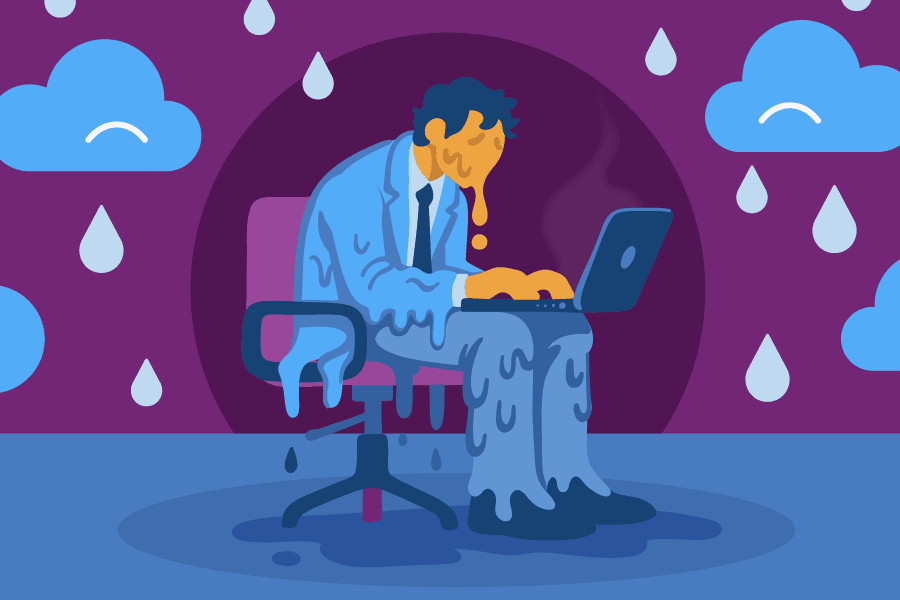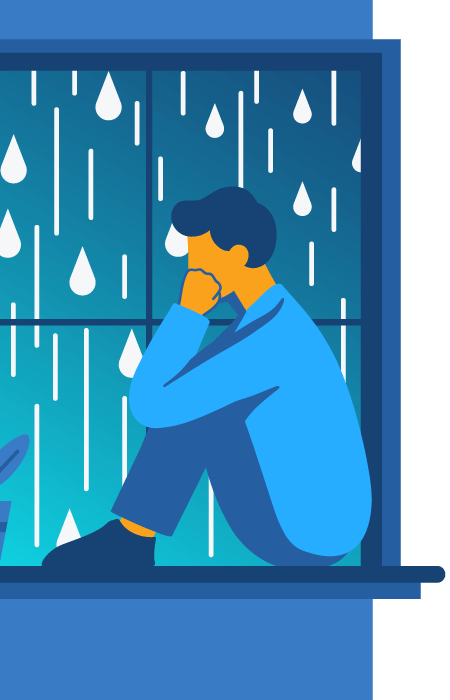What Is High-Functioning Depression?
High-functioning depression is a mental illness that presents as a mild form of depression.
An individual may still be able to tend to daily responsibilities and obligations but will do so while still experiencing other symptoms of depression, such as low mood and fatigue.
Because an individual living with high-functioning depression may still tend to responsibilities, it can often go undetected.
While an individual living with high-functioning depression may continue to hold a job and maintain relationships, it can still profoundly affect a person’s quality of life.
Is High-Functioning Depression Real?
High-functioning depression is not an official diagnosis. However, it can be a useful way to describe the experience of some types of depression.
It is also a controversial topic among mental health professionals since it is not listed by the Diagnostic and Statistical Manual of Mental Disorders (DSM-5.)
However, that does not mean that those living with high-functioning depression are lying, and there are still challenges that those experiencing this kind of depression must address in daily life.
Working with a mental health professional can empower each person to explore these feelings of depression.
For some, high-functioning depression can be diagnosed as persistent depressive disorder (PDD,) which indicates a period of low mood across most days and lasting for more than two years.
Being a mild form of depression that does not naturally go away, those living with PDD may have to find ways to cope with its effects while still tending to responsibilities.
What Is the Difference Between High-Functioning Depression and Depression?
Those living with high-functioning depression may still experience intense low mood. However, an individual may still be able to go to work, maintain relationships, and even accomplish responsibilities.
In contrast, those with more intense forms of depression may be wholly compromised during a depressive episode.
More intense episodes of major depressive disorder (MDD) may compromise a person’s ability to go to work, maintain relationships, and even compromise regular daily routines, responsibilities, and even daily hygiene.
However, those living with MDD may also experience relief between episodes of depression.
Is High-Functioning Depression a Diagnosis?
Currently, the DSM-5 does not recognize high-functioning depression as an official diagnosis.
However, that does not mean that these challenges aren’t real, and the criteria within the DSM-5 are constantly evolving.
Regardless of the form of depression, finding professional treatment and mental health professionals like those at Sandstone Care is essential to effectively addressing feelings of depression.
Causes of High-Functioning Depression
Depression can have many causes, and each person’s experiences with depression will be unique.
Exploring the causes of high-functioning depression in each person’s life is necessary to develop the most effective, personalized treatment options.
How Is High-Functioning Depression Caused?
There is no one, single cause of high-functioning depression.
Each person will have unique experiences both in their daily life living with high-functioning depression and the triggers that inform these feelings.
However, some situations can inform the development of depression, including:
- Traumatic experiences, either in childhood or adulthood
- Family history of mental health disorders
- The existence of other mental health disorders, such as anxiety
- Grief and loss
- Unhealthy sleep patterns, diet, or lack of exercise
- Effects of drugs or alcohol
- Persistent stress, either personal or professional, especially when paired with a lack of self-care
What Happens If Dysthymia Is Left Untreated?
Dysthymia is another name for persistent depressive disorder and can develop into further self-destructive behaviors and coping mechanisms if left unaddressed.
Those living with this form of depression may be tasked with developing their own coping mechanisms, much like those living with high-functioning depression.
However, these coping mechanisms may not always be the best way to process such difficult feelings.
These unhealthy practices include things like:
- Self-harm
- Substance abuse
- Social withdrawal and isolation
- Inconsistent diet
- Increase in risk-taking behavior
Addressing feelings of depression and each person’s manifestation of potentially unhealthy coping strategies in tandem is necessary for genuine change.
What Triggers High-Functioning Depression?
While no two people will have the exact same triggers, some situations can commonly affect feelings of depression. These include:
- Stress in daily life, whether academic, professional, or familial
- Traumatic experiences
- Feelings of loss, from the loss of a job to the loss of a loved one or even the deterioration of friendships or relationships
- Loneliness or social isolation
- Financial challenges
- Perfectionism
Some people may have their own blend of what most profoundly triggers feelings of depression.
For example, one individual may experience increased feelings of depression regarding workplace stresses or perceived failures more than others.
Can Stressful Situations Make High-Functioning Depression Worse?
Yes, stressful situations of any kind can have side effects on a person’s mental and emotional healing, including exacerbating symptoms of depression.
Stress from a person’s professional workplace, interpersonal stresses or strained relationships, financially stressful situations, and more are all common among those living with high-functioning depression.
Some of these stresses may be unique situations that impact a person temporarily.
Others may be more sustained, such as a toxic work environment creating a constant feeling of stress that makes it difficult to break through feelings of depression and complicating daily life.
Signs of High-Functioning Depression
Identifying symptoms of high-functioning depression is the first step toward breaking through a cycle of low mood and creating sustainable change.
Working with professionals to identify the signs of high-functioning depression in oneself or in a loved one can empower people and support them to overcome this type of depression.
Do I Have High-Functioning Depression?
Self-diagnosing high-functioning depression can be complicated. It is always best to talk with dedicated professionals about feelings of depression to truly explore each person’s unique situation.
Even though an individual cannot receive a clinical diagnosis for high-functioning depression, mental health professionals can still help with any symptoms they are experiencing.
What Does High-Functioning Depression Look Like?
High-functioning depression or any other form of depression will be unique to each person but typically involves periods of low mood, pessimism, and burnout.
Some common signs of high-functioning depression may experience include:
- Loss of interest in previous hobbies
- Low energy or motivation
- Persistent or invasive negative thoughts
- Difficulty getting tasks done, like organizing your room
- Intense pessimism and negative worldview
- Low self-esteem
- Inability to focus or concentrate
- Difficulty making decisions
- Feelings of hopelessness or worthlessness
An individual living with high-functioning depression in day-to-day life may continue to accomplish tasks despite these challenges.
However, overall performance may be compromised, and these debilitating feelings are still incredibly difficult to navigate, necessitating professional help.
What Are the Effects of High-Functioning Depression?
High-functioning depression can affect daily life in many ways, from impacting mental health to compromising self-care routines, hobbies, diet, and relationships and informing the development of unhealthy coping strategies.
If left unaddressed, high-functioning depression can also inform other mental health issues, such as anxiety disorders, and can develop into major depression.
Likewise, unhealthy coping strategies like substance abuse and addiction are also possible as an attempt to suppress these negative feelings despite the personal cost.
Some of these challenges include:
- Difficulty tending to personal hobbies or lack of interest in established hobbies
- Lack of self-care or unwillingness to engage in self-care opportunities
- Compromised diet or sleep routine
- Persistent low energy
- Social isolation and compromised personal relationships
Does High-Functioning Depression Have Fewer Symptoms?
As high-functioning depression is not yet recognized in the DSM-5, it can be difficult to compare it to other forms of depression.
Those living with persistent depressive disorder (PDD) may experience a milder form of depression over an extended period.
However, those living with PDD or high-functioning depression are not immune to other forms of depression, and an individual can experience major depression and depressive episodes while also living with high-functioning depression.
Treating High-Functioning Depression
While high-functioning depression can profoundly affect day-to-day life, there is always help available.
Working with Sandstone Care’s dedicated mental health professionals can help each person create their best personalized plan for overcoming feelings of depression.
Can High-Functioning Depression Be Cured?
Yes, there are effective treatments available to address high-functioning depression.
However, there is no single treatment that will immediately cure depression without also working with professionals, family members, and loved ones to create sustainable change.
Some of these potentially effective therapies are:
- Talk therapy
- Journaling
- Cognitive-behavioral therapy (CBT)
- Medications such as antidepressants
- Engaging in group healing and social functions and support groups
Depression, whether high-functioning depression, clinical depression, or any other form of depression, is complicated.
A combination of sustained lifestyle changes, support, and more is necessary to create a truly transformed daily life.
Likewise, no medication can fully address depression without an individual also putting in their own work to make change.
For some, this can be committing to a healthier lifestyle through the cessation of drugs or alcohol, prioritizing self-care, and more.
Others may work with professionals to challenge self-destructive ways of thinking.
How To Help Someone With High-Functioning Depression
Supporting a friend, family member, or loved one living with high-functioning depression can be difficult.
However, there are ways to provide effective support. Some of these strategies include:
- Educating oneself about the symptoms of depression
- Locating local healthcare options
- Listen to the challenges without judgment or making assumptions
- Provide various outlets to promote self-care
- Try new hobbies or experiences alongside those living with high-functioning depression
- Help provide healthy eating options
Each journey in overcoming depression will be unique. Working with professionals can empower support and help family members provide the most effective and directed support.
What to Say to Someone with High-Functioning Depression
While it can be difficult to know what to say to someone with high-functioning depression, it is always a good idea to let them know that they are loved and that you are listening without judgement.
Making oneself available to talk about difficult subjects is paramount, with statements like “I’m here when you want to talk” being a great open invitation to begin.
However, this also should be paired with an actual willingness to listen without judgment.
Offering more direct support is also important.
Rather than asking, “Do you need anything?” which can be a difficult question to answer if an individual is having difficulty making decisions, asking more direct questions like, “Are you hungry for lunch right now?” can provide more direct information and open a clearer dialogue.
What Is the Best Therapy For High-Functioning Depression?
There is no definitive “best” way to address high-functioning depression, but cognitive behavioral therapy can be a great place to start.
The journey to overcoming the challenges of depression will be unique to each person and should be discussed with a professional to personalize treatment.
A combination of psychotherapy, CBT, support groups, and persistent lifestyle changes are necessary for sustainable change and success.
Working with a mental health professional can be the best way to explore all of a person’s options for overcoming depression.
Mental health professionals are also essential for exploring potential medication approaches to overcoming high-functioning depression.
For some, antidepressants that supplement other effective approaches to treatment for sustainable success are necessary.






